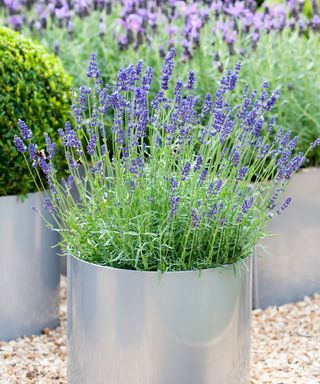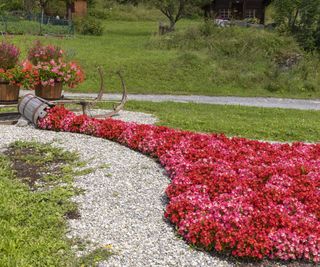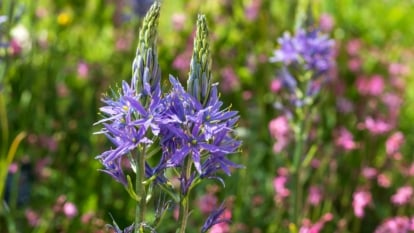Everyone knows how quickly mosquitoes can ruin time outdoors on a warm summer’s evening. These pests are not just annoying, they also spread disease. Anything you can do to deter them from your yard will protect you and your family.
There are numerous ways to control mosquitoes in the garden, including natural solutions that avoid chemicals. Choosing mosquito-repelling plants will help to deter them, especially when their aromatic leaves and flowers are crushed or burned.
However, you can make your garden work smarter by selecting plants that perform double duty, attracting butterflies and other beneficial pollinators. As well as nectar-rich flowering plants, adding butterfly host plants will entice butterflies to lay eggs and enable baby caterpillars to feed.
While it is not possible to eliminate mosquitos from your yard, these flowering plants will help to keep the critters at bay and support local wildlife.
1. Lavender
(Image credit: Alamy)
Lavender (Lavandula spp.) is a fragrant, perennial herb native to the Mediterranean region. The aromatic oil lavender produces repels mosquitoes, and the flowers are attractive to butterflies and other pollinators.
Plant in borders or grow lavender in pots around your outdoor seating area to deter pests.
Lavender thrives in dry, hot climates and rocky soils, but it also grows very well in many typical gardens and is hardy in USDA zones 5 through 10. It is low maintenance and easy to grow but must have soil that drains well and will not tolerate soggy roots. It also needs full sun.
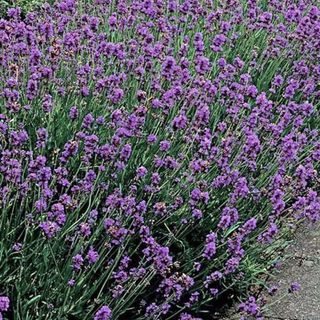
Park Seed Munstead Lavender Heirloom Seeds – $9.95
Grow your own heavenly Munstead lavender from seed. This variety is known for its compact growth and early blooming, delivering a delightful sensory experience.
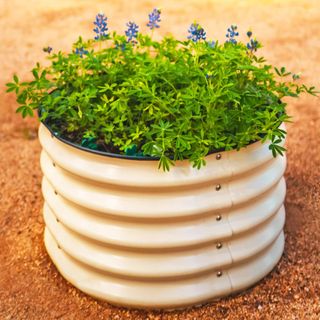 Save $20!
Save $20!
Vego Garden Herb Garden Bed Twin Pack – Now Only $169.95
This set of two compact oval-shaped metal beds, measuring H17xW24 inches, is perfect for growing herbs, or small fruit trees. Regular price $189.95.
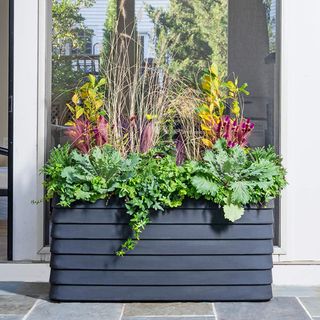
Crescent Garden TruDrop Slat Self Watering Planter Box – From $299
Featuring a sleek slatted design inspired by classic wooden planters and the latest TruDrop self-watering technology, this planter box is ideal for an herb garden.
2. Mint
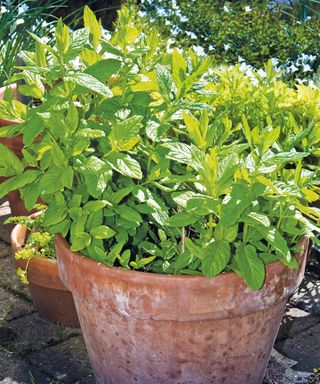
(Image credit: Alamy)
Another fragrant herb, mint (Menta spp.) has a strong aroma that deters mosquitoes. However, its flowers are attractive to pollinators.
Mint is also a useful culinary herb, so it does triple duty. Enjoy mint leaves in savory and sweet dishes and as tea.
The downside to mint is that plants are aggressive and can quickly overtake beds. Growing mint in containers will avoid this issue.
Mint is hardy in USDA zones 4 through 9. It is very easy to grow and requires little maintenance. Plant in containers in partial shade to full sun and ensure good drainage. Pinch off tips to encourage bushy growth.
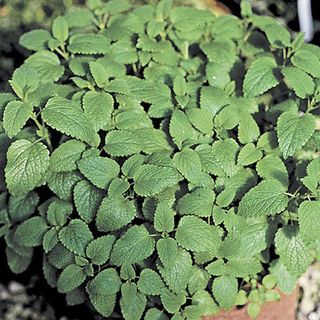
Park Seed Spearmint Seeds – $9.95
This favorite is not only perfect for creating that classic mint jelly or enhancing sauces, but it also makes a delightful addition to the aromatic decor in your home.
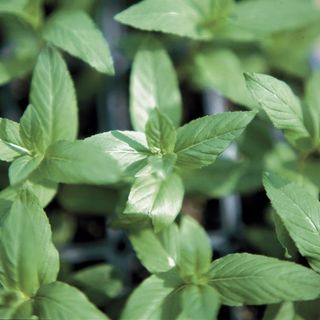
Park Seed Peppermint Seeds – $9.95
Peppermint is a must-have for any kitchen garden. It’s not only delightful to the senses but also a versatile addition to drinks, salads, and baked goods.
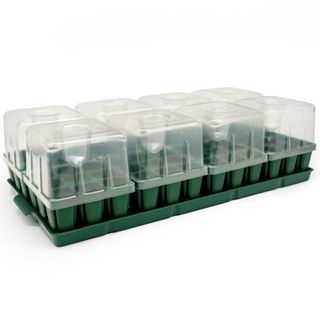 Save $20!
Save $20!
Vego Garden Seed Starting Bundle – Now Only $55.96
Ensure great seed starts with this bundle. Start with a 10×20 inch bottom tray, and then select the seedling tray size you prefer. Regular price $79.95
3. Marigolds
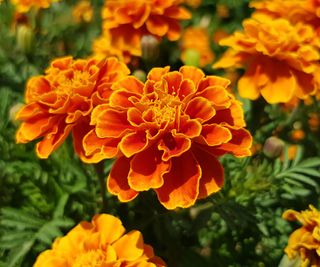
(Image credit: Shutterstock)
Marigolds (Tagetes spp.) are consistently popular annuals in many gardens. They have cheerful, round blooms in shades of red, orange, and yellow and a distinctively strong aroma that mosquitoes and other pests don’t care for. Butterflies, however, will flock to these flowers, as will other pollinators.
You can grow marigolds in USDA zones 2 through 11 as annuals – so don’t expect them to come back next year. Marigolds prefer moist, well-drained soil and full sun. Enjoy blooms all summer long by deadheading marigolds once they are spent.
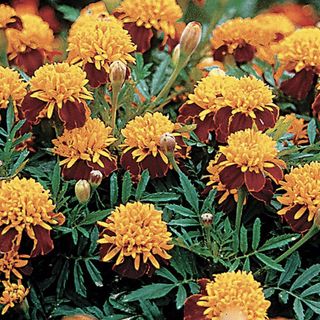
Park Seed Tiger Eyes Marigold Seeds – $9.95
This French marigold variety is sure to captivate with its striking red and yellow blooms. Reaching just a foot in height and width, they’re ideal for container gardens.
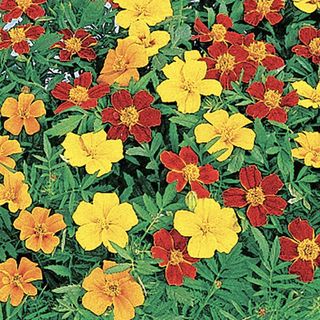
Park Seed Disco Mix Marigold Seeds – $9.95
Where these marigolds grow, butterflies are sure to follow. Ideal for beds, borders, and containers, these little beauties keep their showy hues all season long.
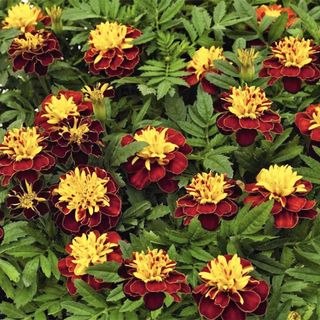
Park Seed Super Hero Spry Marigold Seeds – $9.95
Super Hero Spry has captured hearts nationwide with its stunning burgundy and gold crested blooms. It doesn’t need deadheading, so is hassle-free, and perfect for pots.
4. Geraniums
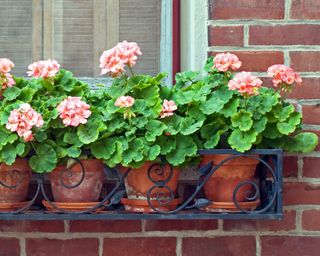
(Image credit: Shutterstock)
Due to an old naming mistake, what we know as annual geraniums are actually species of Pelargonium and not related to true hardy geraniums at all. For pest control, this doesn’t matter, as both are effective at deterring mosquitoes and attracting pollinators.
For the greatest pest control, choose scented geraniums, which are the most fragrant of all Pelargonium.
Growing geraniums in containers will enable you to enjoy blooms all around your outdoor seating area, but they also make good borders and bedding plants.
Geraniums are only hardy in the warmest USDA zones, so expect to grow them as annuals. They require minimal care but prefer full sun and bloom most proficiently with regular deadheading.
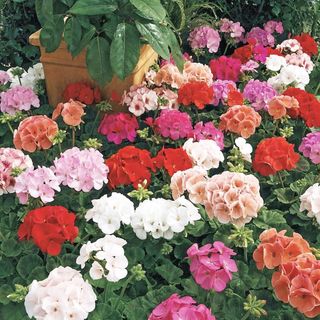
Park Seed Maverick Mix Geranium Seeds – $11.95
These vibrant geraniums are the perfect companion for those hot, humid southern summers. Ideal for pots or window boxes, they also make an excellent bedding plant.
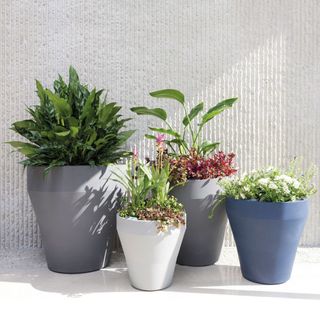
Crescent Garden TruDrop Rim Self-Watering Modern Round Planter – From $149
Perfect for a floral display, these Rim planters mimic traditional Italian rimmed containers but have self-watering functionality and an insulated double-wall design.
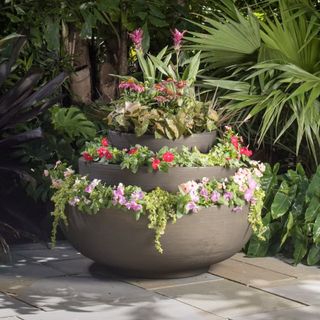
Crescent Garden Orinoco Bowl Planter – From $129
Creative options are limitless with these attractive, functional, and massive Orinoco bowls. Their superior durability means they will endure through weather extremes.
5. Lemon Balm
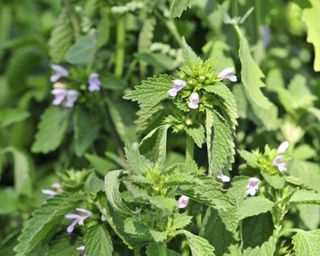
(Image credit: Getty Images)
Lemon balm (Melissa officinalis) is a fragrant, flowering herb that works very well as a mosquito deterrent. You can even rub the leaves on your skin for some additional protection. For people, the aroma is attractive, and its flowers also bring bees and butterflies to the garden.
Lemon balm is hardy in USDA zones 4 through 9. Grow it in full sun and fertile, well-drained soil. Keep the soil evenly moist but not soggy. Pinch off leaves as they grow to encourage bushy growth.
You can keep lemon balm as a pest control tool but also enjoy its fragrant leaves in drinks and desserts.
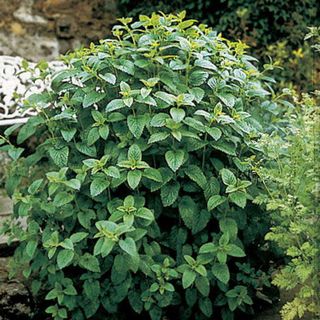
Park Seed Lemon Balm Seeds – $9.95
This herb is a hardy perennial that thrives in zones 3-7. It’s a favorite for creating soothing herbal teas, releasing delightful lemon-scented oils that calm the senses.
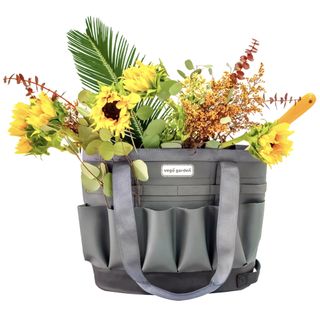
Vego Garden Tool Bag – $119.95
Designed for utility and comfort, the Vego Garden Tool Bag is perfect for storing tools, water, and anything else you need for a successful day out in the garden.
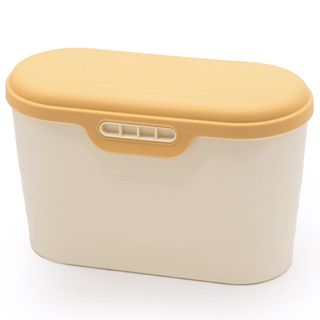 Save $8!
Save $8!
Vego Garden Tool Box – Now Only $31.96
This sturdy toolbox is designed to hang from the edge of your garden bed, and its hinged lid means your tools are never out of reach. Regular price $39.95.
6. Alliums
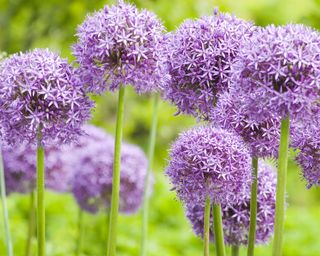
(Image credit: Getty Images)
Alliums (Allium spp.) are ornamental relatives of onion and garlic, grown for their showy, perfectly round heads of small purple flowers on top of tall, straight stalks. They make a striking contrast to other plants in a flower bed. The smell of these onion relatives deters mosquitoes and other pests but attracts pollinators.
You can grow ornamental alliums as perennials in USDA zones 4 through 9. They prefer full sun but can grow in some shade.
Allium is easy to grow, but the blooms won’t last all summer. To get ongoing pest deterrence, plant alliums successively throughout the season.
7. Fennel
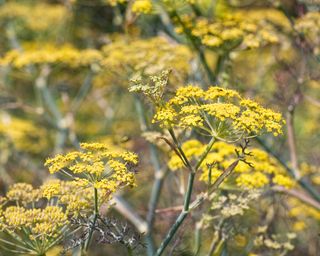
(Image credit: Alamy)
Fennel (Foeniculum vulgare) deters mosquitoes and provides vital food for butterflies. Bronze fennel even serves as a host plant for swallowtail butterfly caterpillars.
Once the feathery fronds and flowers have done their work against pests and in support of butterflies, the plant can be harvested for use in the kitchen. Florence fennel produces bulbs that can be eaten as a vegetable.
Grow fennel in vegetable beds in USDA zones 4 through 9. It prefers full sun, fertile soil, and good drainage. Avoid adding too much compost or fertilizer when growing fennel. Overly rich soil results in a bland flavor.
Harvesting fennel for the kitchen means removing the plant that has provided pest control and attracted butterflies. Consider growing some of your fennel ornamentally. Its tall, feathery growth makes a nice backdrop for shorter plants.
This article features products available from third-party vendors on the Gardening Know How Shop.


